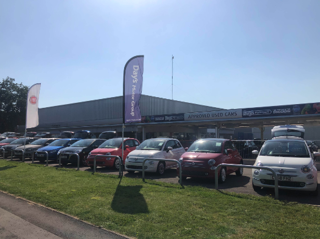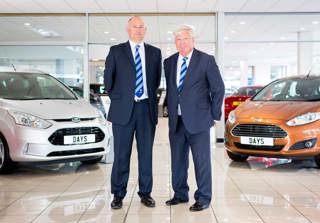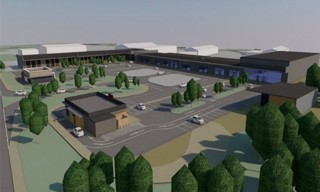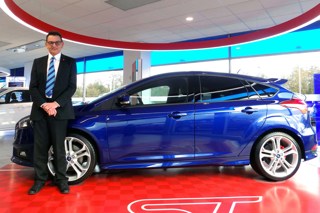Since the turn of the millennium, multi-franchising has become a prominent feature of UK new car retailing. Small regional groups built from decades of partnership with a single brand have recognised their inherent exposure to new model cycle dips and customer migration and, to cushion such effects, have expanded with alternative brands.
Since the turn of the millennium, multi-franchising has become a prominent feature of UK new car retailing. Small regional groups built from decades of partnership with a single brand have recognised their inherent exposure to new model cycle dips and customer migration and, to cushion such effects, have expanded with alternative brands.
Since the turn of the millennium, multi-franchising has become a prominent feature of UK new car retailing. Small regional groups built from decades of partnership with a single brand have recognised their inherent exposure to new model cycle dips and customer migration and, to cushion such effects, have expanded with alternative brands.
Since the turn of the millennium, multi-franchising has become a prominent feature of UK new car retailing. Small regional groups built from decades of partnership with a single brand have recognised their inherent exposure to new model cycle dips and customer migration and, to cushion such effects, have expanded with alternative brands.
But for Swansea-based CEM Day, Wales’s largest franchised dealer group, multi-franchising hasn’t been the only answer. While the family-owned company has added a few other volume franchises alongside its key partnership with Ford during the past decade, much of its growth has come from bolt-on sidelines that emerged when its management team was quick to identify new profit opportunities over the decades.
As a result, the brands Day’s Rental and Day’s Contract Hire have become as significant in South Wales as the 10 dealerships which trade under the Day’s Motor Group brand. CEM Day also operates its own motor finance subsidiary, which has a £10 million loans book and more than 2,000 customers. In fact, Days Contract Hire has become the fourth-largest independently-owned leasing company in the UK, with customers nationwide and 10,400 vehicles on its books.
It’s a capital-intensive approach to expansion, and one which won’t suit all franchised dealer groups. Funding support is crucial to be able to invest in the fixed assets required and CEM Day is a highly-geared business as a result. Yet the results speak for themselves: in 2012, return on sales was 3.39%, a record result for the business, plus it won the 2012 AM Award for Best Retail Group.
Chief executive Graham Day, grandson of Charles Edward Manton Day, who founded the company in 1926, said supportive, understanding banks were crucial.
Since the 2008 banking crisis, certain funders were withdrawing from the market or becoming too expensive. CEM Day’s main funder at the time came under strain and became “intrusive”, so the group changed its main funder to Barclays in order to obtain greater facilities. It also invited other competitive funders on board, as well as increasing facilities with existing funders.
This has enabled it to increase the value of its rental and contract hire fleets by 110% and 47% respectively since 2008 with sufficient funding facilities for future expansion. It also purchased its own storage facility, with capacity for up to 1,400 vehicles, and has two vehicle transporters operational full-time.
Graham Day added: “My father started the rental company, I think he was fed up with selling cars to rental companies at no profit, so he decided to cut out the middleman and do it himself. And the same with contract hire. I had a fleet department about 20 years ago selling to various contract hire companies, and we looked at the figures at the year end and from selling thousands of cars we’d actually made a loss. So we decided to get our own contract hire.
“So we diversified that way. You know the 80/20 rule that 20% of your effort gives you 80% of your profit? That’s very much the way with us.”
[page-break]It is only in the past decade that these operations have truly come to the fore, however. A combination of low motor retail margins and difficult economic conditions required CEM Day’s directors to consider the profit growth offered by its non-retail streams.
A tough territory
Since the decline of the mining industry, a high proportion of the population of south west Wales has been on a low income. Gross household disposable income is £13,800, 87.5% of the UK average. One in four adults is in the ‘economically inactive’ bracket, which includes people with long-term illnesses, unpaid carers, those who retired early and others not actively looking for work. Swansea has the third highest proportion of Motability customers, after Glasgow and Liverpool.
Russell Day, sales director, explained: “We’ve got a very unique base here. There is a lot of low income, or public sector workers that have certain deals with manufacturers, or Motability recipients, so it’s tough to get true retail business here. Some manufacturers struggle to understand this.”
CEM Day’s business is split equally into one-third Motability, one-third retail and one-third Ford employees.
While Ford ran a car parts factory in Swansea, it fed CEM Day’s high local market share. During the course of its 80-year partnership with Ford, the dealer was geared up for a partner with 30% national market share, and it outperformed this thanks to Ford’s attractive new car scheme for its employees. But last decade, after Ford pulled out of Swansea and other brands ate into the manufacturer’s national share, CEM Day decided to multi-franchise, despite the challenges posed by the different systems, requirements and incentives often demanded by each brand. It first took on Peugeot in Swansea, then at Haverfordwest. It then introduced Fiat in Swansea in 2010 and an unsuccessful trial with a Nissan dealership has left the group retaining its aftersales franchise for Swansea. Overall, multi-franchising has given the dealer group the opportunity to keep its customers when they’ve fancied trying another brand.
Russell Day added: “The fact that there was a Ford plant here has meant we’ve enjoyed good success with Ford over the years. Okay, there isn’t the Swansea plant anymore, but there’s still the Ford engine plant in Bridgend and we have a lot of customers that bought from us that still buy from us that work in Bridgend or retired in Swansea. The repeat customers we’ve been serving for decades are our lifeblood.”
That CEM Day has won the Ford Chairman’s Award – a customer satisfaction accolade – for 17 years is a testament to its success. It averages more than 90% completely satisfied for CSI, and recognises when a customer issue arises it may be better to take a financial cost and keep that customer than risk them going elsewhere and telling their friends about a bad experience. Almost two-thirds of its sales customers are repeat visitors.
“There’s no point making a killing once, we’d rather shave the beast every year,” said Graham Day.
[page-break]The dealerships use a Pendle-based sales process, but one which the group has toned down and tailored to its own company values and experience. A process is crucial to ensure customer expectations are met, he said, but in cases when a salesman is dealing with a customer they’ve known for years the process is often less important than the relationship and trust between them.
“One of the biggest things for us is the loyalty and quality of our staff,” said Russell Day. He has reminders on his calendar that show some staff are in their 30th or 40th year with the company, and ensures they get a thank you from the directors for their work. He believes there is a clear connection between the loyalty and quality of staff and the experience and relationships they have with customers. The group’s investment in training, both manufacturer-driven and independent, is significant, he said, but training alone cannot make the company successful.
“A lot of it is from experience and constantly trying to improve every aspect of the business. You do get to know how to make a customer feel valued, and similarly for the staff. We don’t have outrageous packages for staff, but there’s a culture that exists within the group and a sense of security. It’s not down to reward necessarily, it’s more to do with the working environment and the colleagues we work with.”
“We’re a family business, not a plc, and any member of staff knows they can go speak to their managers to discuss problems. It’s important to show that we do care about our people.”
It also puts great trust in systems and controls. Monthly performance reviews and meetings take place, using video conferencing technology to save time travelling between branches, and its ADP dealer management system enables the senior team to measure each department in real time. Sales staff are set targets on test drives and email capture as well as sales volume and add-ons.
Aftersales systems include a centralised parts wholesale centre for all franchises, 14 vans with telematics trackers to measure utilisation, a telesales centre with 20 dedicated direct lines that handle incoming calls in addition to booking services and rental vehicles. It also introduced a service app and online service-booking facility and has online parts and accessories shops under the Motor Parts 4U brand.
The group is introducing iPads in all its showrooms to allow staff to provide a level of service that customers will expect after they’ve done their own research online.
Russell Day explained: “We’ve tried to remain as cutting-edge as possible. There still isn’t a proper system out there that I’m happy with, to be honest, that meets my expectation of what should be available for our sales people to use.
“You go to your supermarket and they can swipe a product you buy and it’ll build a history of how many times you’ve bought it, your Nectar points etc. Our industry is suffering from being a bit behind other retail industries.”
[page-break]So what’s next for CEM Day? Finance director Stuart Smith said it won’t rule out adding more franchises in the future should the right opportunities arise, particularly those stealing share from the major brands, but the group is cautious not to push too far.
However, it has invested £120,000 in a VOSA test lane for trucks, coaches and buses at its Swansea Iveco outlet and added an MoT testing station at its Fiat dealership that is capable of serving motorhomes and light commercials as well as cars.
Yet, strategically, its preference is to expand its daily rental and contract hire brands, given the greater returns offered and the preference of many local authorities to rent rather than purchase, said Smith.
The company now has 11 Day’s Rental locations in Wales from Newport to Haverfordwest, and in 2011 it opened its first in England, at Shrewsbury. Bristol, Birmingham and south west England are in its sights.
The dealerships are still a vital part of the group. Graham Day describes Day’s Motor Group as “the glue that sticks it together” and the “passion” of the family. Having dealerships doesn’t help the company buy its rental vehicles more cheaply, but it allows it to repair them and dispose of them effectively. Unlike many franchised dealers lately, CEM Day doesn’t struggle to find quality stock, in fact it is expanding its used car sales.
It recently began trialling premium-brand used car sales, with stock sourced from its contract hire operation that previously would have been traded out or auctioned, and has trialled cars from £2,995 at its Llanelli site and used commercial vehicles in Cardiff. In addition, it has long operated its Day’s Motor Park used car supermarket, whose launch coincided with the film Jurassic Park – hence the dinosaurs dotted around the site.
“It’s fair to say that without hitting your targets, the dealership model doesn’t stack up profitability-wise, and that’s the way the manufacturers want it because you know you’ve got to get your target,” says Graham Day.
“You’ve got to treat the core business in its entirety and make sure you’re still making money on that, and we do. We ensure we get the best out of our dealerships, each one, branch by branch, department by department. So there are definitely possibilities of expansion of the core business because it stacks up quite well against some of the competition.”
The scale and funding behind CEM Day also leaves it in the fortunate position of often being able to snap up the pack deals on offer from its manufacturer partners.
But Stuart Smith has a caveat: “Our business is traditionally highly geared and all we need is for interest rates to go up substantially and five years from now we could be looking at the core business as doing really well and the contract hire and rental business as suffering.”
CEM Day factfile
Turnover £186m (2012)
Profit £6.3m
Franchises Ford (6) Peugeot (2), Fiat (1), Iveco (1), Nissan (1 aftersales only)
New car and commercial vehicle sales 8,800 units (incl 4,000 Ford cars)
Used car sales 7,300 units
AMi comment
CEM Day is a classic example of the successful 'local hero'.
If you want a new Ford (and now Peugeot or Fiat), there must be few people in South Wales who wouldn’t at least have Days on the list if not first choice.
If you want a good used car, the same would be true: geographic focus, brand focus, an identifiable name in a community, particularly, a family company with an identifiable brand that still links to the individuals behind the name.
Not all brand and geographically focused groups make good returns, and it took time for the synergies to develop at Days.
Ten years ago RoS (return on sales) was below the magic 2%.
However, for most of the next 10 years, it has exceeded this benchmark and for the last two years has bettered 3%.
One of the key success factors for the local hero model, is the capacity to meet most if not all of their customers’ mobility challenges from existing resources.
This seems to be part of the CEM Day story.
Whether you want a short term solution (rental); a longer term solution but don’t want to buy (contract hire); want the finance to buy, tailored to your requirements (a finance subsidiary); need help (Motability); CEM Day has grown to include that activity. “Why go anywhere else?”
There are of course additional benefits – if you can make them work. Having your own finance company and rental and contract hire operations allows for flexibility in meeting manufacturer targets. If you can’t retail it, then you can probably find a different type of customer who justifies the registration.
And the cars passing through the rental and contract hire fleets make excellent used cars, if you get the portfolio profile right and have strong remarketing processes for cars outside the profile.
The issue is gearing.
Retaining multiple integrated profit streams allows you to service more of each customer’s needs and allows some economies of scale and of management. However it requires considerably larger funding lines than the more traditional model.
Days have done well to expand their activities while keeping gearing stable. However, that stability is at a relatively high 70+%. Even in the current low interest rate environment this means an interest bill approaching £4 million.
Return on capital employed (RoCE) has also been fairly stable at around 7%, which is low for such a profitable group and would be higher but for the amount of capital required for the rental and contract hire fleets.
It is interesting that Arnold Clark operate on a similar principle, but on a much larger scale.
It makes a RoS, unusually for a large group, north of 2%, (but less than Days). It has a RoCE around 7%.
However, over time Arnold Clark has reduced gearing, while increasing their rental and contract hire activities, from over 60% to about 40%.
Perhaps Arnold Clark should take a leaf out of CEM Day’s book on how to make profits.
And CEM Day can learn from Arnold Clark how to control capital usage.
Login to continue reading
Or register with AM-online to keep up to date with the latest UK automotive retail industry news and insight.




















Login to comment
Comments
No comments have been made yet.